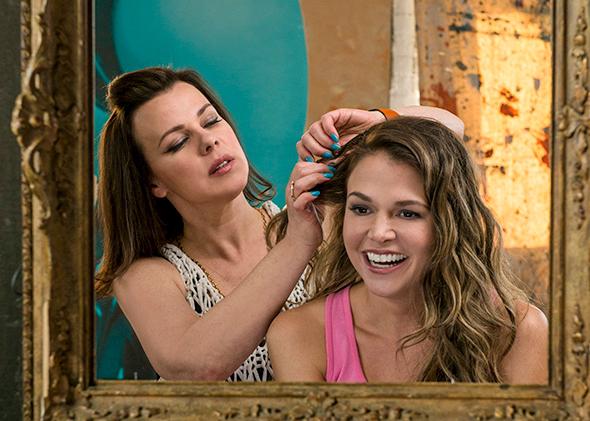When the critically acclaimed but little-watched Bunheads was canceled after one season, fans were devastated that Amy Sherman-Palladino’s quirky follow-up to Gilmore Girls was ending. The ensemble cast included an impressive quartet of tween ballerinas, but the real breakout star was the Broadway vet Sutton Foster. And now Foster’s follow-up, Darren Star’s Younger, which debuted Tuesday on TV Land, has its own quirky premise: Foster plays a 40-year-old passing herself off as a 26-year-old, and that’s the least implausible part of the show.
After a cheating and gambling husband leaves her divorced and broke, stay-at-home suburban mom Liza (Foster) decides it’s time to go back to work. She moves in with her artist friend Maggie (the always wonderfully sharp-tongued Debi Mazar) in Brooklyn and tries to get a job in publishing, where she worked before having a child. (Her daughter is studying abroad in India while this is taking place.) After multiple uncomfortable conversations about how she’s too old and has been out of the business for too long, Liza is hit on at a bar by a 26-year-old who assumes she’s the same age, inspiring her to try to pose as a twentysomething to get a job.
Cue makeover. Foster does, in fact, look very young, even without a wardrobe overhaul that relies heavily on flannel. But her physical makeover pales in comparison to her “tech makeover,” which includes changing her AOL email to Gmail and magically deleting her Internet presence. (This isn’t the only time the show displays a comical cluelessness when it comes to anything related to the Internet.) Liza creates an alternate life timeline for herself and memorizes the names of One Direction members. And just like that, she lands a job in marketing at a publishing house where she helps develop media campaigns and meets up-and-coming editor Kelsey (Hilary Duff).
To say the publishing house’s media efforts are obtuse would be unduly praising them. They are illogical to the point of being baffling and yet take up a surprising amount of the plot. The second episode involves a Twitter campaign to promote a reissue of an e-book of Pride and Prejudice. Then Joyce Carol Oates—whose own actual Twitter presence, with all its attendant controversies, the show completely ignores—needs a marketing push, and her Twitter campaign involves a twist on a #toplesstuesday hashtag that is actually slightly clever but fully pointless. The only way the show seems to legitimately understand social media is how it relates to an older crowd—specifically, a plot centered on Goodreads and how the book-club set uses it.
But in an era in which “FUBU” TV—shows written “for us, by us,” à la Girls and Broad City—is successfully dominating the “young white people in Brooklyn” genre, Younger is most useful as a caricatured example of how this genre has jumped the shark. Darren Star, who also created Sex and the City, has made a valiant attempt to plumb the world of hipster twentysomethings in Brooklyn as a non-twentysomething himself. But Younger manages to feel, in some ways, like a cartoonish embodiment of all the criticisms people lobbed at Girls—the narrowness of perspective, the lack of self-awareness, and the extreme whiteness—just painted in much broader strokes. And it has none of the qualities that make shows like Girls and Broad City so deft and original (namely, their pointillistic interest in the absurd, particular struggles of this demographic). Younger’s fairy tale premise of reliving your 20s in your 40s requires us to suspend our disbelief in a different way than other “young white people in Brooklyn” shows. Still, it lacks the nuance and cleverness that Star brought to Sex and the City while also missing all the chaotic joy that Broad City and Girls find in this slice of millennial life.
What’s most confusing is the question of whom the show is targeting. It’s clearly part of TV Land’s attempt to rebrand for a millennial audience—at least, it can’t possibly be for the older women it so mercilessly mocks. While Liza is given a second chance at her 20s, the other women over 40 on the show are either clueless and evil (like Liza’s miserable boss, played by Miriam Shor) or, like Maggie, weird anomalies who only seem to hang out with 26-year-olds.
It’s hard to believe that the show was designed for those 26-year-olds either, though, because it is so resistant to capturing any real aspect of what their lives are like. There are moments when it just feels like characters are shouting social media buzzwords (Hashtag! Trending!), hoping that one will stick and resonate with audiences. Younger makes older women seem dumb and helpless and desperate, and paints younger women as a monolithic enemy.
That’s not to say it isn’t compulsively watchable. The plot about Liza’s romance with a 26-year-old is thoughtfully done, even if his tattoo-artist career feels like the show trying too hard to be cool. But any success that Younger achieves is thanks to Foster—who, at 40, and despite the absurd situations she’s placed in—is somehow more convincing at playing a twentysomething than the 27-year-old Hilary Duff.
